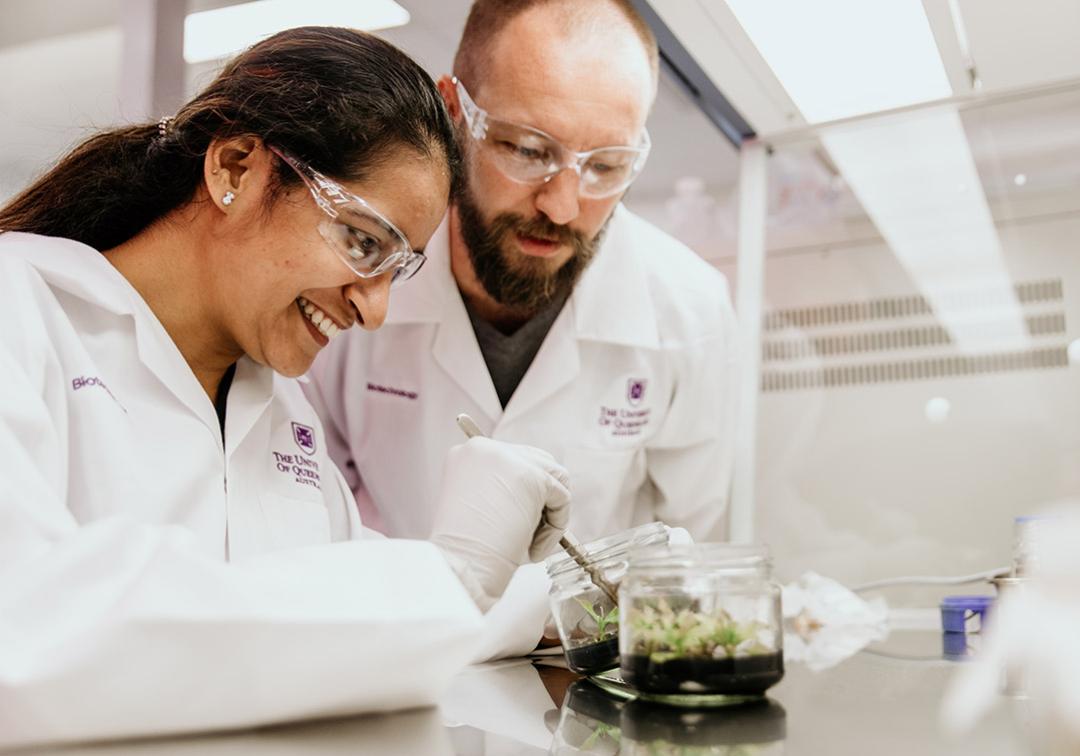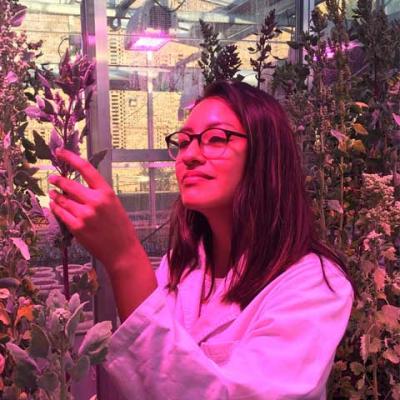
Bachelor of Biotechnology
Overview
Want to help feed, fuel and heal the planet? Combine life sciences with specialised practical training and entrepreneurial skills to join a fast-evolving industry improving global health and wellbeing.
Biotechnology is a creative entrepreneurial field, where scientists design innovative products and technologies, pioneering new frontiers in health, agriculture, science, engineering and rapidly emerging disciplines.
At UQ, you’ll learn from award-winning scientists who have successfully commercialised their discoveries. You'll receive hands-on training applying cutting-edge techniques in state-of-the-art laboratory and research facilities similar to professional working environments.
You'll examine biotechnology’s varied applications, from antibody engineering to fight disease and genetic plant engineering to increase agricultural yields, through to vaccine design, cell and tissue culture technologies, and more.
Build your expertise in one of 5 biotechnology specialist areas:
- Agricultural
- Chemical and Nano
- Medical
- Molecular and Microbial
- Synthetic and Industrial.
Complement your specialist learning with a minor:
- Bioinformatics
- Innovation and Entrepreneurship
- Science Communication.
Deepen your understanding of the key issues within biotechnology such as intellectual property, regulatory compliance, quality assurance and quality control.
Learn how to assess the market potential and financial viability of new products or technical services such as vaccines, diagnostics, biopharmaceutical drugs, transgenic plants or innovations in stem cell therapy.
Choose a student industry placement or internship offering a project, where you can apply your skills and acquire experience in an authentic science-related workplace. You'll solve a technical or operational problem and report on your findings.
Graduate equipped for a wide variety of employment opportunities in Australia’s thriving life sciences sector, which includes the biotechnology, pharmaceutical, food, medical and agricultural technology industries.
Program highlights
- Learn from Australia's leading educators in biotechnology and equip yourself with advanced skills.
- Access world-class laboratory, research and computer facilities to gain hands-on experience.
- Take advantage of UQ’s strong links to industry, government and the research community to build your professional network.
Majors
Tailor your studies to suit your goals. This program offers these options:
- Agricultural Biotechnology
- Bioinformatics
- Chemical and Nano Biotechnology
- Innovation and Entrepreneurship
How you'll learn
Your learning experiences are designed to best suit the learning outcomes of the courses you choose.
- Lectures
- Tutorials
- Research experience
- Laboratory work
- Workshops
What you'll study
At UQ, degrees are called 'programs' and subjects are called 'courses'. Here's a sample of the courses you could study in this program:
- Introduction to Biotechnology
- Commercialisation of Biotechnology Products
- Quality Management Systems in Biotechnology: GMP, GLP, GCP
- Biochemistry & Molecular Biology
- Genes, Cells & Evolution
Dual programs
Double your skills and your opportunities with a dual degree. You can study the Bachelor of Biotechnology as a part of these dual programs:
Career possibilities
Our programs prepare you for your first job and beyond. Depending on which major you choose, here are some of the careers you could be on your way to:
- Production bioinformatics engineer
- Research officer
- Bioprocess scientist
- Quality control manager
- Biochemist
- Research scientist
- Microbiologist
- Cancer researcher
- Trial coordinator
- Lecturer
Average annual salary range
Microbiologist
seek.com.au
Average annual salary range
Research Associate
seek.com.au
Next steps after graduation
Your high-level knowledge and technical skills will be relevant to a range of modern biotechnologies.
Careers in biotechnology span many industrial and service sectors, including health, agriculture, diagnostics, environment, forestry, law and commerce.
With more than 2,600 companies operating in the growing Australian biotechnology industry, you’ll be well placed for roles in:
- agricultural industries (in areas such as plant breeding and engineering)
- chemical companies (in areas such as nanotechnology and biosensor applications, and developing drug leads)
- diagnostic companies (undertaking diagnostic test design, development and production)
- government agencies (as a technology analyst or commercialisation officer)
- legal and consulting companies (as a business plan analyst)
- pharmaceutical companies (in areas such as drug design and development or pharmaceutical production, as well as research institutes, universities or industry)
- venture capital companies
- startup ventures.
Alternatively, you can use this qualification to further your research ambitions and make significant contributions to knowledge by enrolling in the Bachelor of Biotechnology (Honours), which could lead to postgraduate studies.
Events
See all events
29 June - 6 July
Year 11 Queensland Chemistry Winter School

29 June
Queensland Biology Winter School, Year 12
Stories
See all stories
Careers
Study biotechnology at UQ to cultivate a cutting-edge career
5-minute read

UQ people
Science skills + business savvy = biotech success
4-minute read
Stories
See all stories
Careers
Study biotechnology at UQ to cultivate a cutting-edge career
5-minute read

Careers
Powering up: UQ programs fuel next generation of sustainable energy leaders
5-minute read
Entry requirements
Prerequisites
- General English subject (Units 3 & 4, C)
- Mathematical Methods (Units 3 & 4, C), and
- One of Biology, Chemistry or Physics (Units 3 & 4, C)
Prerequisites
- General English subject (Units 3 & 4, C)
- Mathematical Methods (Units 3 & 4, C), and
- One of Biology, Chemistry or Physics (Units 3 & 4, C)
Entry score threshold
| ATAR / Rank | IB |
|---|---|
| 81 | 30.5 |
These are the lowest adjusted scores we made an offer to in Semester 1, 2025. Entry scores are based on the most recent Semester 1 intake and are updated in April each year. Meeting the entry score threshold doesn't guarantee admission.
Guarantee your place at UQ: If you meet our guaranteed minimum ATAR you could secure an offer for your preferred program.
English language requirements
IELTS overall 6.5; reading 6; writing 6; speaking 6; listening 6. For other English Language Proficiency Tests and Scores approved for UQ
TOEFL iBT (including Paper Edition) - Overall 87, listening 19, reading 19, writing 21 and speaking 19.
PTE Academic - Overall Score of 64 and 60 in all sub bands.
BE - A minimum overall grade of 4 plus a minimum grade of C in all macro skills.
CES - Overall 176 and 169 in all sub bands.
OET is not accepted.
There are other ways to meet the English language requirements. For some programs, additional conditions apply.
Student visas
International students who are accepted into full-time study in the Bachelor of Biotechnology are eligible to apply for an Australian student visa (subclass 500).
There are a number of requirements you must satisfy before a visa is granted, including the Genuine Student (GS) requirement.
Entry score range
This table shows the range of entry scores for recent secondary students offered a place in the B Biotechnology for Semester 1, 2025
| Without adjustments | With adjustments | |
|---|---|---|
| Highest | 99.7 | 99.95 |
| Median | 91.05 | 92.45 |
| Lowest | 78.8 | 81.7 |
Who you'll study with
Here's a snapshot of our student intake for this program in Semester 1, 2025:
| Applicant background | Number of students | Percentage of all students |
|---|---|---|
(A) Higher education study | N/P | N/P |
(B) Vocational Education and Training (VET) study | 0 | 0% |
(C) Work and life experience | 0 | 0% |
| (D) Recent secondary education | ||
| 45 | 52.9% |
| <5 | <5 |
| 0 | 0% |
International students | 34 | 40% |
Total | 85 | 100% |
"<5" — The number of students is less than 5.
N/A — Students not accepted in this category.
N/P — Not published. The number is hidden to protect the privacy of students in other cells.
Need help meeting the entry requirements?
Majors and minors
Majors
Tailor your studies to suit your goals. This program offers these options:
Minors
Tailor your studies to suit your goals. This program offers these options:
Majors
Tailor your studies to suit your goals. This program offers these options:
Minors
Tailor your studies to suit your goals. This program offers these options:
Fees and Scholarships
Indicative annual fee
Approximate yearly cost of tuition (16 units). Your fees will vary according to your selected courses and study load. Fees are reviewed each year and may increase.
$9,930
2026
Approximate yearly cost of tuition (16 units). Your fees will vary according to your study load. Fees are reviewed each year and may increase.
AUD $58,056
2026
Government assistance
Financial aid
As an international student, you might be eligible for financial aid – either from your home country, or from the Australian Government.
HECS-HELP
Domestic places in the Bachelor of Biotechnology are Commonwealth supported, as long as you meet all Commonwealth supported place eligibility requirements.
This means the cost of your education is shared between you and the Australian Government. Instead of tuition fees, Commonwealth supported students pay what are called student contribution amounts.
If you have a Commonwealth supported place, you may also be eligible for HECS-HELP. This is an Australian Government loan scheme to assist eligible students with the cost of their student contribution amounts.
Centrelink support
The Australian Government offers a number of income-support payments to eligible Australian university students.
Scholarships
You may be eligible for more than 100 scholarships, including:
How to apply
Applying online
If your senior schooling is from outside Australia, you can submit your application to UQ. Or, if you prefer, you can use an approved UQ agent near you.
The program code for the Bachelor of Biotechnology is 2456.
How to apply for undergraduate study
If your senior schooling is from Australia
Submit your application to the Queensland Tertiary Admissions Centre if you're an international student who is currently studying:
- Australian Year 12 (in Australia or another country), or
- the International Baccalaureate in Australia.
The QTAC code for the Bachelor of Biotechnology is 731101.
Applying through QTAC
All domestic applications should be submitted to the Queensland Tertiary Admissions Centre (QTAC).
The QTAC code for the Bachelor of Biotechnology is 731101.
Important dates
If you’re studying Year 12 in Australia, go to the QTAC website to check the closing date for this program.
If you’re applying to UQ, the closing date for this program is:
- To commence study in semester 2 - May 31 of the year of commencement.
- To commence study in semester 1 - November 30 of the previous year.
Visa processing times vary. Apply and accept your offer as early as you can.
To learn more about UQ dates, including semester start dates, view the Academic Calendar.
Important dates
To check the closing date for this program, go to the QTAC website.
To learn more about UQ dates, including semester start dates, view the Academic Calendar.
Admissions schemes
Applying to university can be both exciting and daunting, which is why we’ve tried to make the process as simple as we can.
We have several schemes in place to improve your chances of getting a place at UQ.
Pathway options
A rank or score doesn’t determine your potential.
If you're not offered a place in your first-choice program – or if you don't meet the entry requirements – you still have a number of options.
Aboriginal and Torres Strait Islander applicants
For support with applying – or if you have any questions about university life – get in touch with our Aboriginal and Torres Strait Islander Studies (ATSIS) Unit.
Explore other programs
Express yourself. And your interest.
They say choosing a degree is hard, which is why we've made it easy. Register your interest and we'll send you everything you need to know about applying to UQ.








